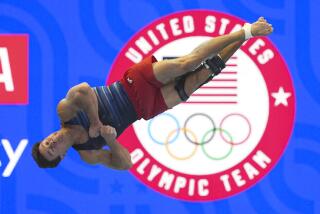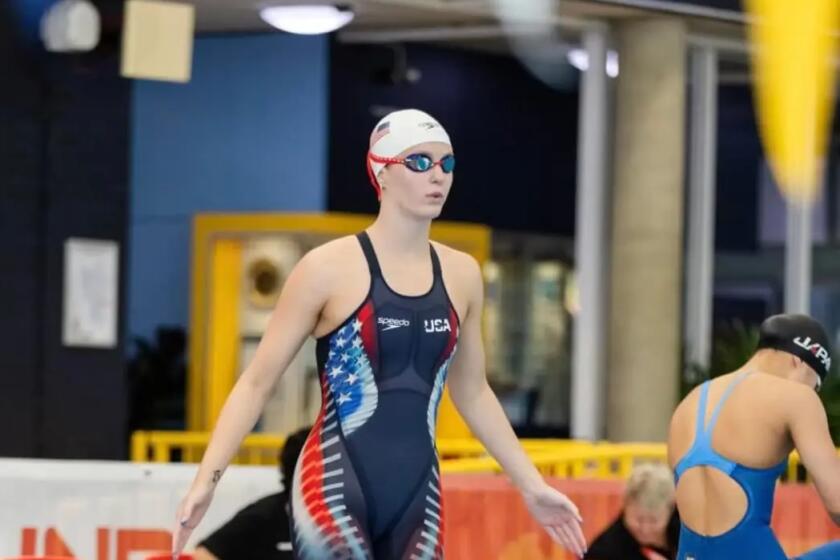After Tokyo, Powell Comes Down to Earth at 29-2 1/2 in Modesto : Track: Jump is wind-aided, but it’s enough to show that his 29-4 1/2 was no fluke.
- Share via
MODESTO — The last time long jumper Mike Powell was in the world spotlight, the name of the legendary Bob Beamon was invoked. The occasion was the World Championships in Tokyo last August and it was punctuated by Powell breaking Beamon’s record, the longest standing world record in the sport.
Powell’s record of 29 feet 4 1/2 inches at Tokyo was remarkable, but slightly marred by the insinuation that while he jumped farther than anyone ever, he hadn’t had an impressive series of jumps.
Powell proved Saturday that his record was no anomaly--he jumped 29-2 1/2, wind-aided, which would have equaled Beamon’s former record, and put together a respectable series of jumps, including two long fouls.
“We’re at a new level,” Powell said. “I came here trying to jump a world record. My goal was to come here and shock some minds and let people know that I’m not going to be inhibited by the barriers. I still don’t know how far I can jump.”
Powell took advantage of a warm, breezy day at Modesto Junior College to begin his outdoor season. The winning jump was the fourth-longest ever under any conditions and the longest ever on U.S. soil. The event was clearly the centerpiece of what is annually a low-key meet with high-power athletes.
Meet organizers did everything they could to accommodate Powell, beginning with offering a $25,000 bonus for a world record. Powell also requested that the long jump pit, which was the standard 31 feet in length, be extended to 36 feet. The long jump was placed in the middle of the meet schedule, starting at 3 p.m. to allow the crowd of 5,127 to give the event its undivided attention.
One thing not amended for Powell was the length of the runway. Powell’s approach run is 185 feet, so Powell had to start his approach on the track and jump a metal curb before he got on the runway.
Powell’s first jump was a respectable 27-9 1/2, but Powell appeared disappointed. His second was better--28-7 3/4--with an aiding wind of 3.0. As Powell landed deep near the end of the pit, the crowd gasped. Powell checked the measuring tape and gestured to the stands, saying, “It’s on the way.”
It was a prophetic remark. On his next jump Powell unleashed his best jump of the day, seeming to hang in air above the pit.
Powell burst from the pit with arms clenched above his head, certain that the jump was significant. His next three jumps were foot fouls. Powell explained later that he didn’t properly adjust to the wind behind his back and he overran the takeoff board.
The last two jumps were well into the pit.
“This is a good way to start my season,” he said. “I’ve been jumping well in practice, so I expected this. I’m not afraid to say I think I can jump 31 feet.”
The meet yielded other impressive early-season performances:
--Andre Cason won the men’s 100 meters in a wind-aided time of 9.88. Cason was beat out of the blocks by former world record holder Leroy Burrell, but led at 50 meters and held off Burrell’s late charge. Burrell was second in 9.96.
Cason said he and Burrell bumped arms at about 40 meters and he took a few strides to recover. Cason’s coach, John Smith of UCLA, attributed the mid-race lapse to a break in concentration.
Cason was pleased but not impressed with his time, saying he backed off with five meters to go.
--Gail Devers won the women’s 100 meter hurdles in 12.75, the fastest time in the world this season. Devers called the race technically sloppy.
“It’s OK,” Devers said. “I hit hurdles and it wasn’t sharp, but it’s my first race. The time shows me how much faster I can go.”
USC’s Inger Miller won the 100 meters in 10.9 seconds, hand-timed, and the 200 meters in 23.19, also hand-timed. Both times were wind-aided.
Dean Starkey, formerly of the University of Illinois, won the pole vault is 19-4 3/4, the third best ever by an American.
More to Read
Get our high school sports newsletter
Prep Rally is devoted to the SoCal high school sports experience, bringing you scores, stories and a behind-the-scenes look at what makes prep sports so popular.
You may occasionally receive promotional content from the Los Angeles Times.







